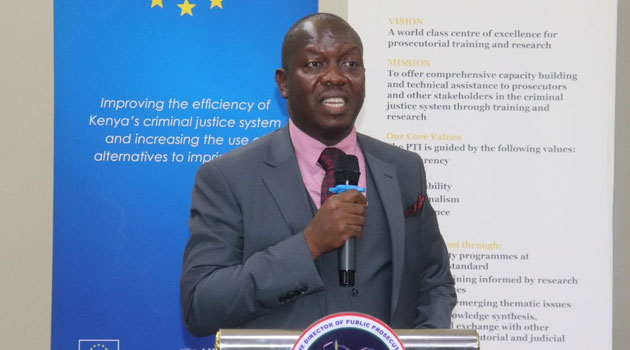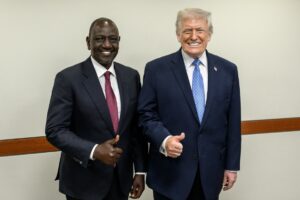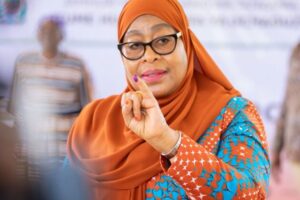
NAIROBI, Kenya, Jul 21 — The Director of Public Prosecutions (DPP) has defended the controversial decision to charge several anti-government protesters under Kenya’s Prevention of Terrorism Act (POTA), insisting the charges are grounded in law and national security considerations—not political retribution.
In a statement released Monday, the Office of the Director of Public Prosecutions (ODPP) addressed mounting criticism over the use of anti-terrorism laws in the wake of nationwide protests on June 25 and July 7, which saw multiple government buildings, including law courts and police stations, vandalized and torched.
“The charges under the Prevention of Terrorism Act should be understood within the framework of established legal thresholds and national security imperatives rather than interpreted as efforts to suppress legitimate political expression,” the statement read in part, asserting that the actions under investigation were “not spontaneous demonstrations, but calculated and coordinated acts of violence.”
The DPP cited Chief Justice Martha Koome’s own characterization of the Kikuyu Law Courts arson attack as an act of terrorism.
Speaking on June 26 after inspecting the charred remains of the court, Koome condemned the violence, saying,
“This [was] not merely an act perpetrated by criminal elements, but an act of terrorism.”
She urged Kenyans to differentiate between peaceful protest and deliberate acts intended to destabilize national institutions.
Terrorism threshold
According to the ODPP, the destruction of courts, police stations, and attacks on government personnel met the legal threshold for terrorism under Sections 2 and 4 of POTA—particularly where the intent was to cause serious disruption to essential services and instill fear in the public.
However, the move has sparked backlash from civil society and opposition leaders, who view the charges as a dangerous overreach and a blatant attempt to stifle dissent.
On Monday, a coalition of more than 20 human rights and legal organizations under the Police Reforms Working Group (PRWG) condemned what they termed the government’s “weaponization” of anti-terror laws.
“We are deeply concerned by the continued misuse of the Prevention of Terrorism Act to manage public order in more than 100 other cases,” PRWG said, warning that such practices undermine the criminal justice system and risk damaging Kenya’s international standing in counterterrorism cooperation.
The arrest of renowned activist Boniface Mwangi on terrorism and money laundering allegations drew particular outrage.
The DPP subsequently dropped the charges touted by the police, opting instead for lesser offences under the Firearms Act—a move critics view as a tacit admission of overreach.
“Boniface Mwangi [is] not a terrorist,” PRWG stated. “His arrest followed a coordinated disinformation campaign targeting human rights defenders and opposition voices.”
‘Ridiculous’ charges
Siaya Governor and veteran lawyer James Orengo slammed the terrorism charges, calling them “ridiculous.”
“By stretch of any tortured legal definition and factual foundation, it’s ridiculous to charge Boniface Mwangi and our children who have demonstrated a high level of political consciousness with terrorism,” Orengo said.
“Protected speech and political action should never [be] criminalized.”
On July 16, former Chief Justice David Maraga also weighed in, accusing President William Ruto’s administration of weaponizing the criminal justice system to intimidate dissenters.
“Ruto’s government is clearly weaponizing the criminal justice system to terrorize the arrested youth and their families,” the former CJ said after appearing to hold brief for protesters arraigned at the Kahawa Law Courts.
“The reckless use of the Prevention of Terrorism Act and ATPU [is] a violation of—or a significant threat to—Kenyans’ freedom of assembly and expression; the right not to [be] arbitrarily detained or denied bail; and the right to freedom and security of the person.”
In response to the uproar, the DPP emphasized that all prosecutions will adhere strictly to the rule of law and due process.
“We wish to reassure the public that all charges have [been] brought strictly based on available evidence,” ODPP stated.
“Each accused individual will [be] accorded a fair trial, legal representation, and full access to due process in line with the Bill of Rights under the Constitution of Kenya.”
1,500 arrests
On July 15, Interior Cabinet Secretary Kipchumba Murkomen confirmed the arrest of nearly 1,500 people in connection with the violence and destruction reported during the protests.
Murkomen described the unrest as “raw and unprecedented terror” unleashed by “marauding gangs of looters and barefaced anarchists.”
He disclosed that of the 1,500 arrests, several suspects are facing serious charges including terrorism, murder, robbery with violence, arson, sexual assault, and malicious damage to property.
Ongoing investigations by the Serious Crimes Unit and the Anti-Terrorism Police Unit have placed 50 suspects under serious crimes investigations and 71 under anti-terror review.
Murkomen said these groups targeted private businesses and government infrastructure across multiple counties, causing extensive losses and plunging many Kenyan families into poverty.
He said the chaos claimed fourty-two lives with close to 600 injured including “496 law enforcement officers” .
“One life lost is one too many. We mourn every life lost and extend our deepest sympathies and heartfelt condolences to the affected families.”





